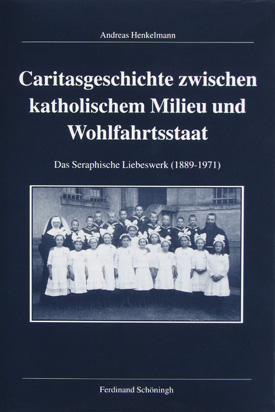Henkelmann, Andreas: Caritasgeschichte zwischen katholischem Milieu und Wohlfahrtsstaat. Das Seraphische Liebeswerk (1889–1971), Paderborn [u. a.] 2008

»Saving children’s souls is the most divine of all works!« In the 1890s, this and similar appeals heralded the triumphal march of a Catholic association that is largely unknown today. In 1889, Franciscan Tertiaries led by the Capuchin priest Cyprian Fröhlich founded the Seraphisches Liebeswerk (Seraphic Charity; literally »work of love«) in Koblenz-Ehrenbreitstein, thereby launching an unprecedented success story of a Catholic charity organization that connected personal religious motivations to charitable donations. By 1914, approximately 400,000 Catholics were supporting the association, attracted, in part, by its rich »spiritual treasure of grace.«
The association, which looked after »religiously and morally endangered« children, faced the constant challenge of positioning itself in respect to the state’s own children’s and youth welfare efforts. That led to a variety of tensions and conflicts over the compatibility between Catholic identity and the expectations of the welfare state. This study uses the Seraphisches Liebeswerk to make a significant contribution to the scholarship on Caritas (Catholic Charities) and monastic orders, as well as to the social and mentalities history of the Catholic milieu.
To order our publications, please, contact your local bookshop or the publishing house Schöningh in Paderborn.
